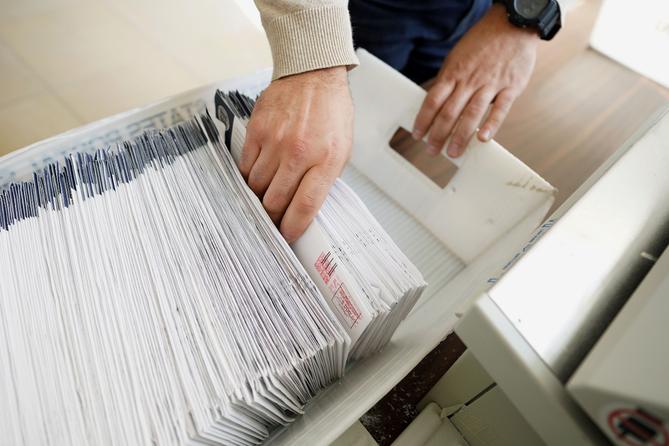This article is made possible through Spotlight PA’s collaboration with Votebeat, a nonpartisan news organization covering local election administration and voting. Sign up for Votebeat's free newsletters here.
A group of citizens are challenging hundreds of mail ballot applications in southeast Pennsylvania, claiming they were submitted by voters who have moved to a new address that disqualifies them from voting in the state.
The challengers, apparently working as organized activists across multiple counties, are claiming that these voters are ineligible for a mail ballot because the address in the state’s mail ballot request file does not match an address connected to the voter’s name in a U.S. Postal Service database. This method of cross-checking has been regularly criticized by election experts as insufficient to confirm that the records refer to the same person.
The challenges filed with counties claim the voters are no longer Pennsylvania residents and thus are not eligible voters and cannot receive a mail ballot. The challenges apparently cite data from the Postal Service’s National Change of Address database showing a record that someone matching the voter’s name has filed an address change for mail delivery.
Pennsylvania law requires that someone must be a resident of Pennsylvania to be an eligible voter but does not require that their Pennsylvania address be where they receive mail.
A coalition of voting rights groups is pushing back against the challenges, calling them a “malicious attempt” to disenfranchise voters.
"We are very concerned about the validity and intent of these challenges, deliberate abuse of the election system, and the time and energy it will take for our local election officials to address them,” said Susan Gobreski, president of the League of Women Voters of Pennsylvania. “We will defend the freedom to vote for all Pennsylvanians."
According to Pennsylvania law, mail ballot applications can be challenged up until 5 p.m. the Friday before the election — for a fee of $10 each — on the grounds that the applicant is not qualified to vote.
The challenges appear to be a coordinated effort. Broad and Liberty, a conservative Philadelphia-based news outlet, reported Monday that it had reviewed a list of the 865 challenges, targeting voters registered in Bucks, Chester, Montgomery, and Delaware Counties. Broad and Liberty did not name the group behind the effort, and reported that the challenges are mostly targeting Democratic voters’ applications.
Votebeat and Spotlight PA confirmed with Bucks County that its election office had received 191 challenges Friday from the same person. Spokesperson Jim O'Malley said a hearing by the board of elections would need to take place to determine the validity of the challenges, and that the hearing had not yet been scheduled.
Chester County spokesperson Rebecca Brain said the county had received 212 challenges, all using the same standard phrasing, and that a board of elections hearing was scheduled for Friday to review the challenges.
Megan Alt, a spokesperson for Montgomery County, said the county has not received any challenges yet, but would address them if they come. Jim Allen, elections director in Delaware County, said someone did recently come in with 140 challenge forms, but when they were informed they needed to use the county’s affidavit, they took all 140 forms and left.
According to a petition reviewed by Votebeat and Spotlight PA, the person filing challenges in Chester County is Diane Houser. Houser is a plaintiff in a lawsuit brought this summer by a right-wing group called United Sovereign Americans challenging the state’s voter roll maintenance.
Houser did not immediately return a call or email seeking comment.
Such challenges using USPS data may also be occurring in other states. A lawsuit filed in Harris County, Texas, this month seeks to challenge thousands of registrations based at least in part on what the lawsuit describes as a “simple comparison” of the change of address data to the county voter rolls.
David Becker, executive director of the nonpartisan, nonprofit Center for Election Innovation & Research, said USPS change-of-address data can be unreliable on its own for determining voter eligibility because it does not contain unique ID numbers for individuals, birthdates, or driver’s license information, and often doesn’t differentiate between family members with the same or similar names, like a senior and junior.
While election officials do use this data for list maintenance, they use it in combination with other sources such as driver’s license records to improve confidence that they’ve got the right person.
“No data scientist would ever consider matching a National Change of Address file to another file and say with confidence this is the same person,” Becker said. “And of course you definitely don’t want to say that when you are in close proximity to an election and might disenfranchise someone.”
The American Civil Liberties Union of Pennsylvania, in a letter to all 67 counties, is cautioning them that deeming the applications ineligible on the basis of the challenges would violate the law, since the only requirement to receive a mail ballot is that a person be a registered voter. The ACLU asserts that the USPS data can not be used to distinguish between a person’s plan to temporarily relocate or to permanently move, and thus is insufficient alone to prove the voter is not qualified.
The letter also reminded counties that it is too late to remove voters from voting rolls, as federal law prohibits systematic removals within 90 days of an election.
Carter Walker is a reporter for Votebeat in partnership with Spotlight PA. Contact Carter at cwalker@votebeat.org.
